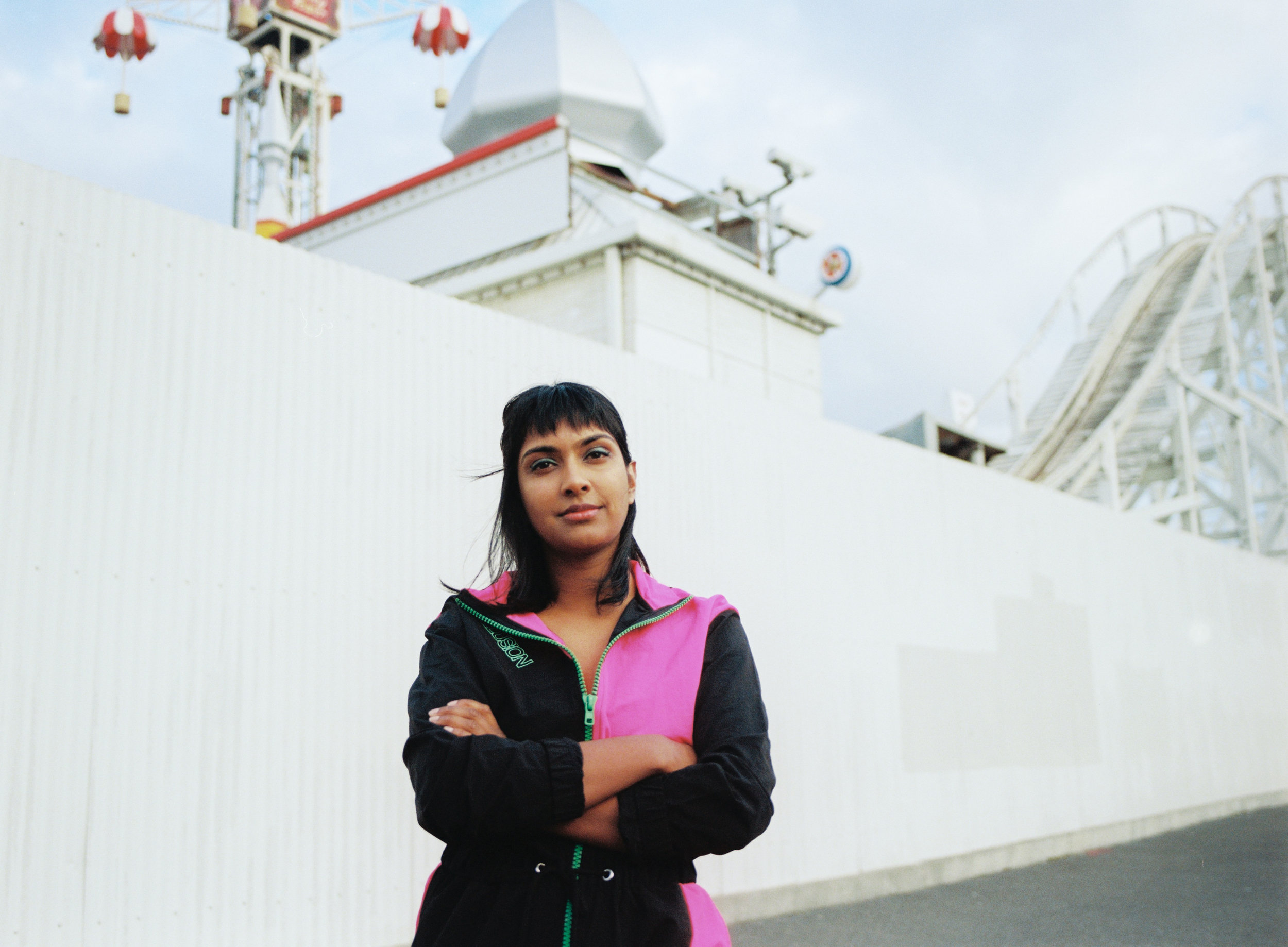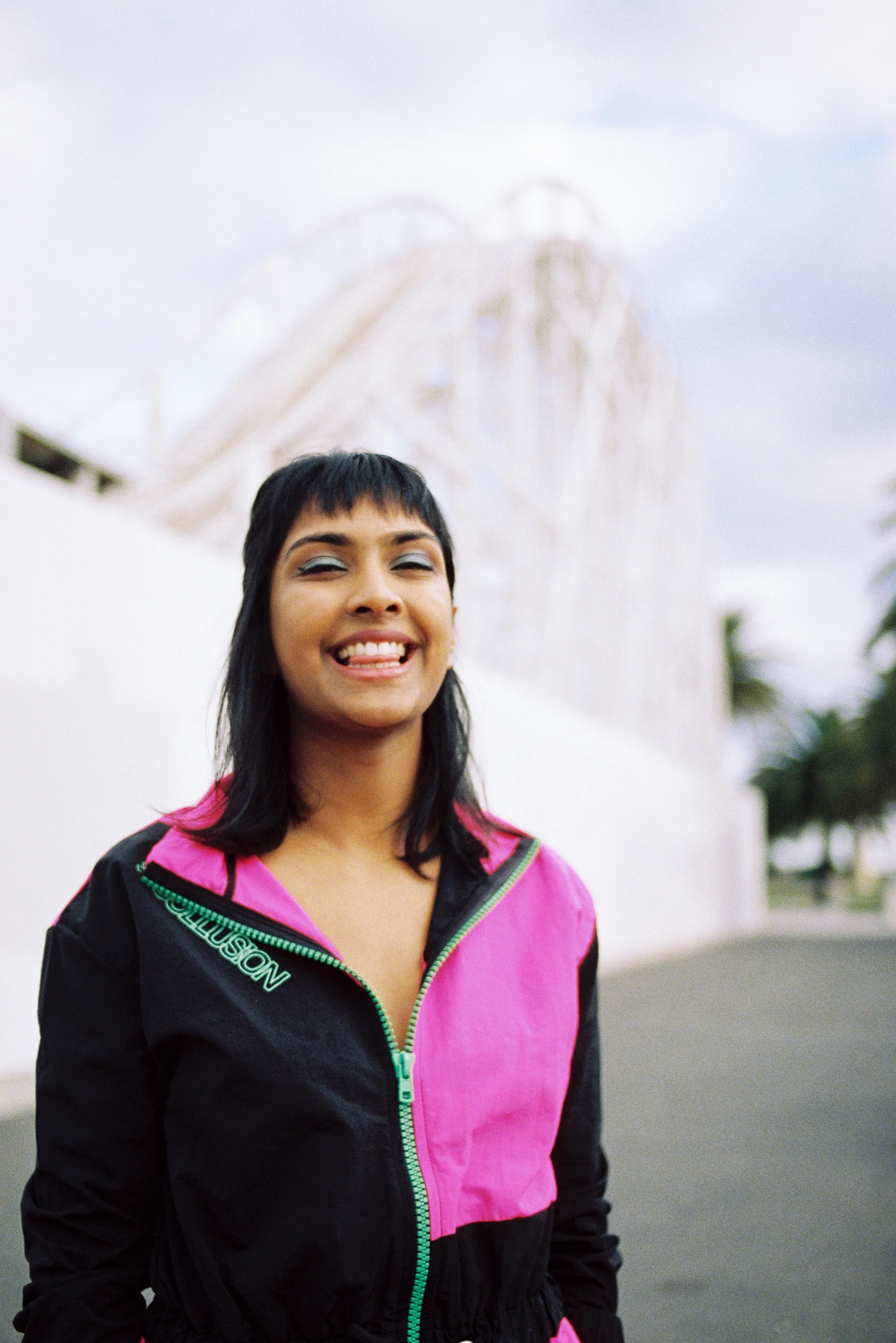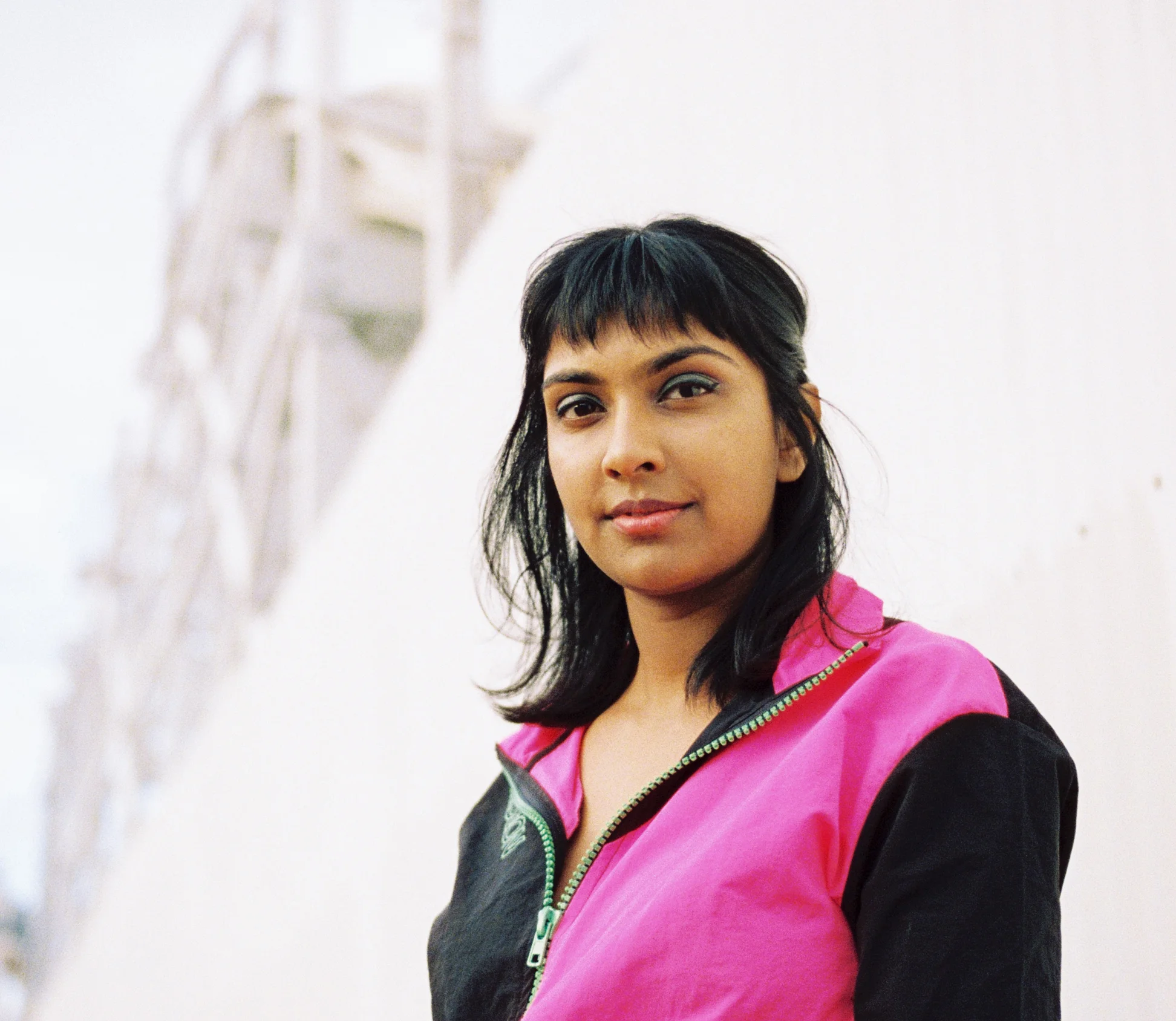Interview #113 — Natesha Somasundaram
by Cher Tan
Natesha Somasundaram is a playwright, screenwriter and actor. She was most recently an inaugural resident playwright at the Melbourne Theatre Company, and has written for GET KRACK!N (ABC) as well as an episode of the to-be-released sci-fi YA series THE UNLISTED (ABC).
Natesha’s debut play Jeremy and Lucas buy a Fucking House was nominated for a Greenroom Award for Best Writing.
Natesha spoke to Cher about the power of boredom in propelling creativity, the frustration of labels and the importance of self-awareness in the quest towards a unique writing voice.
Natesha is performing in ‘Oh No! Satan Stole My Pineal Gland!’ at Melbourne Fringe Festival 2019, directed by Lou Wall and previous LIMINAL interviewee, Jean Tong. Buy tickets here.
Can you tell us about your journey towards the performing arts? How did you come to find yourself in it, and is it the best mode of self-expression for you?
Growing up, my parents worked really long hours so it meant I was often left unsupervised at home with a Playstation 2 and their Foxtel subscription. Naturally, I pretty much watched every TV show under the sun, and played copious amounts of video games. When my parents finally came home, they would watch the news, and I would read until I passed out.
I was also lucky enough to grow up with a billion cousins and was definitely that annoying kid who would direct everyone in make-believe ‘plays’ and ‘concerts’ every time we got together—this included the hit classics Weight Watchers Corporation – the musical; Sailor Moon, on stage!—except all 7 of us are Sailor Moon at the same time!; and Destiny’s Child, Live!—but all 7 of us are also Beyonce, at the same time!. One time I tried to make my brother star as Billy Elliot in a Billy Elliot musical parody that I tried to film on my mum’s Samsung 2005 flip phone, and let me tell you, he was not into it. But all of this was super formative for my understanding of storytelling and performance when I started writing professionally in my twenties.
When I dropped out of my law degree a few years ago, no one was more surprised than me—I really thought I was going to be working for the UN by the time I was thirty. And when I got my first professional writing opportunity, I took it thinking I would take six months off uni to do it for fun and return to law to pursue a ‘real’ career, but I never ended up going back. Initially, I really struggled to accept seeing being an artist as a profession; I’d always seen it as a hobby, and a pretty self-indulgent one.
Now, I still feel like I’m just starting out. But after properly engaging with various kinds of art forms, understanding how storytelling can allow whole communities of people to empathise with each other, and witnessing for myself how humour can be used as a tool to engage and educate, have I realised that, yeah, you know what, the world already has way too many human rights lawyers. That’s fucked up! What the world really needs is another freelance artist.
Do you write or perform in plays hoping that people will experience certain emotions or trigger particular thought processes? Like with humour diffusing otherwise serious issues (such as in Jeremy and Lucas Buy a Fucking House), where do you see this process sitting in the work that you do?
Humour has definitely always been a huge element of my work. I think I got into comedy purely for attention: when I found out I was actually really bad at stand-up comedy, I learned to use humour as a literary tool to disarm and engage an audience, and then deep-throat them with cool and smart ideas. So I don’t think I write so much to attempt to dictate a thought process or a specific emotion, as I try to present several new and opposing ideas, which leaves heaps of space for an audience to make of it however they will. I think if you want to make any kind of art, you have to accept that you have no control over how anyone will react to whatever you present to them, and that’s my favourite part!
With that in mind, I love to create work that sits in ambiguity—uncomfortable or otherwise. Big call, but I think that art and literature which offers a clear-cut resolution is heavily favoured by mainstream culture, because it’s easier and much more comfortable to know that there is an answer in this otherwise clusterfuck of a universe. And I get that.
Shit’s dark in 2019, and it’s hard to constantly sit in a nihilistic headspace of everything’s fucked and we’re all gonna die. But I also think it’s important to acknowledge—especially as we move forward into this very tumultuous political, technological and environmental era—that most things are not going to be resolved and there is no longer a clear binary of good vs. bad. I think it’s more important than ever to be adaptable, empathetic, and constantly ready to re-evaluate your moral compass. I guess those are the kinds of broad ideas I try to encourage in my work. But I also really like to fuck with silly stuff, because life’s too short and dicks are whack!
I learned to use humour as a literary tool to disarm and engage an audience…
There’s something about seeing a film, TV show or play where people are engaged together at once, sometimes feeling the same thing—that essence of collectively being ‘in the now’, feeling something about performances that don’t repeat themselves in exactly the same way. Does this element drive your work? Where do you see screenwriting both intersecting with and differing from playwriting, and what specific faculties do you employ for each?
I think the major difference between theatre and television, and the difference that I’m most conscious of when making work, is how audiences receive work. As a result, the way in which I approach television and theatre is hugely disparate.
Commercial theatre is a whole thing and by a whole thing, I mean it’s definitely a medium for the upper-middle class. It’s always at some venue that’s hard to get to, you always have to pay a significant amount of money, you have to make a whole night of it, and then there’s the risk that you may not even like it. People often celebrate the “liveness” of theatre as more real and valuable than television, but I think this actually means that if you can go to the theatre regularly, you have the luxury of having spare time and disposable income—which is great, good for you, earn your money—but it also means you’re likely in a position to be much more socially responsible for the position you’re in. In that way, I strive to make theatre that is inherently (albeit subtly) challenging to that demographic, because I don’t think there’s enough of it. I think there’s so much work out there that appeases and celebrates the type of people who can go to theatre, and that becomes kind of irresponsible to the very political nature of theatre itself.
On the other hand, television is a whole other thing, and by whole other thing, I mean it is accessible to virtually everyone—especially with the explosion of subscription video-on-demand like Netflix.
As a result, I think a lot of television provides comfort, warmth, humanity and distraction to a vast amount of people, unrestricted by geography—having to pay only $13.99 a month for a Netflix subscription can be life-changing in a small way. In this way, I am a big fan of commercial, symmetrical superficial, structured, genre-bound television. On paper this might sound more restrictive, but I think if you can be smart about it, and if you’re making television with the right people, there’s definitely room for social consciousness and experimentation within that.
I mean, this is a heaps broad analysis, and both industries are much more complicated than what I’ve laid out. But I think fundamentally I’m most driven by and conscious of not just the active presence of any audience, but the political environment an audience inhabits, as well as the political and moral ideas they value the most at that point in time.
I think fundamentally I’m most driven by and conscious of not just the active presence of any audience, but the political environment an audience inhabits…
In a 2016 piece for Peril , you write:
I’m deeply worried sometimes that Australian theatre is a shrinking bubble; a vacuum containing the same people engaging with and creating works—making it seemingly inaccessible and alien to people outside of this realm.
How do you navigate this in the shows you write and perform in? In what ways can so-called “outsiders” to the industry subvert this?
It’s interesting and kind of difficult having to reflect on this nearly four years after I wrote that essay. And really, it’s also four years since I first started playwriting, because in some ways it feels like not much as changed. I’ve also had a bit more time to #define myself as an artist and what #art means to me.
With total, brutal, whatever honesty: I really think it’s the responsibility of heavyweight cultural institutions and cultural leadership in Australia to be accountable to their waning audiences, not individual artists or individual prospective audience members. At its best, I think theatre goes beyond being labeled as “theatre”—it’s magical, provocative, totally immersive and present. It becomes genre-defying, era-defining and forges bridges between new audiences and new forms.
But you don’t get to that stage by remounting Shakespeare or another “Australian Classic” on a moving stage every twelve months because some Barbaras from Brighton are willing to fork out an exorbitant amount of money to see it, yet again. It sucks that a lot of my non-theatre peers still see theatre as kitsch and unworthy of their interest, but it’s also a symptom of that ever-present divide. I know that not all art-forms are for everyone, but I think exciting, compelling and new-audience-flocking theatre comes from genuine experimentation and risk, and trusting that new audiences and artists are intelligent and savvy enough to hold their own. It also inevitably means having the space to allow work to be mediocre, to fail, and to allow artists to learn and exponentially grow because of that. Sure, it might mean losing a gaggle of Barbaras, but it also will steadily invite new generations of people to the theatre. It also means trusting local artists, and giving them a platform to develop their work to bring to an international standard, instead of dismissing emerging artists and importing heavily funded and well-developed international works.
I remember travelling to the states and being not only astounded by the substantial quality and variety of theatre available at any given time, but also discovering that the average play there takes four years before it’s considered fully developed, including several staged productions which are really used as publicly-staged developments. Whereas here, I found that there’s an overarching expectation to churn out an exceptional full-length play in under twelve months (with maybe a few days of internal development if you’re real lucky)—near impossible unless you’re being fully funded by your family and/or you’re a prodigy. Having both of these factors aligning together at once is like a one in a billion probability, and of which I am neither lol.
You can’t make art or create culture without genuinely bold risk, and it’s sorely lacking in the higher echelons of many Australian cultural institutions. And if current cultural leaders can’t see that, then that in itself means that leadership needs to change too.
I really think it’s the responsibility of heavyweight cultural institutions and cultural leadership in Australia to be accountable to their waning audiences, not individual artists or individual prospective audience members.
Do you have any advice for emerging playwrights and screenwriters?
When I first started writing, I was super insecure and self-conscious, so I would send my work to literally anyone to receive some sort of validation that it was ‘good’. And honestly that was the worst thing I could have done. I’d try to take on everyone’s feedback and it would mutate my writing to the point where I wouldn’t recognise it anymore.
Now, I’m very protective of my work. I really try not to show it to anyone until I’m confident it’s at a stage where I feel good about it, regardless of what anyone thinks. I’m really selective about who I ask to read my work, and while I write down and consider all feedback, I’ll also take it with a grain of salt. I wish I’d learned to trust myself, my taste and my artistic instinct much earlier, but you gotta wade through the shit to get to know yourself, and I definitely had to wade through a fair bit of shit before I worked that out.
Making art takes lots and lots of time, and most of it involves just thinking through your idea, and writing shitty first drafts (also no one told me this and I wish they did!) Make stuff that you like, live your life, pat lots of dogs, and just do you. Don’t buy into that bullshit that you have to go to XYZ university or that you have to be writing 10 hours a day and you have to read x-amount of books or scripts in order to be a ‘good’ writer! Sure, those things can be helpful—but so does understanding yourself, being able to craft a distinct voice and perspective and having a sense of purpose.
Live your life and really, really get to know yourself because that’s the stuff that makes good writing fucking spectacular.
Who are you inspired by?
Everyone, all the time, so much. I love all kinds of art and books and ideas and people; anything that’s wildly unapologetic is my minimum threshold. My current heroes are Lil Nas X, Ava Duvernay and this guy on Youtube who does maths tutorials. I love Pen15, Big Mouth and everything that Cartoon Network has ever made. Sorry to Bother You and Rat Film are currently my favourite movies, and earlier this year I read God of Small Things by Arundhati Roy and I would go as far to say that it kind of changed my life. I also saw Japanese artist Saeborg at Dark Mofo dancing to 2009-era chart toppers dressed in a latex pig costume, and I would say that fully changed my life.
Making art takes lots and lots of time…
How do you practice self-care?
Great question, I’m definitely the burn-out queen. But during rare moments of non burn-out lucidity, I like to try and do a whole bunch of sports that I am average/below average at.
What does being Asian-Australian mean to you?
This has always been a tricky question for me, because I never identified as Asian-Australian when I was growing up. My parents assimilated pretty hard when they came to Australia, and I was inundated with Australian and American media from the early-00s to the point where I legit thought I was a white person until some janky-ass kid was racist to me for the first time.
So it was only when I started writing professionally did institutions and media label me as “Asian-Australian”. I was really frustrated by this, because when I started writing I had no vested interest in writing about my identity, and this insidious expectation to do so is even more frustrating. I got a lot of my early work in both theatre and television because of this, and while I tried to push against it at first, I came to understand that this label would be inextricable from me no matter how many dick jokes I could fit into a play. So I started to subvert these expectations in my writing—by both leaning into them and throwing them away completely—to leverage new, contemporary and realistic representations of Asian-Australians.
It’s a tricky term, because I think it’s both empowering and problematic. For me, it’s opened up a whole community; it’s led me to forge many precious friendships and relationships, but I’m still unsure if I personally identify with the term. Asian communities are unfortunately rife with intra-cultural racism—because I’m technically South Asian, I’ve been often told by Asians from other communities that I’m not allowed to identify with the term “Asian”. And I’ve certainly been told at various levels within Australia that I’m not allowed to identify as completely “Australian” either.
I think I sit in a grey area of both Asian-ness and Australian-ness and something more global than that as well. But I’ll probably have a different answer in a week from now, so we should touch base then.
I think I sit in a grey area of both Asian-ness and Australian-ness and something more global than that as well.
Find out more
Interview by Cher Tan
Photographs by Hashem McAdam







